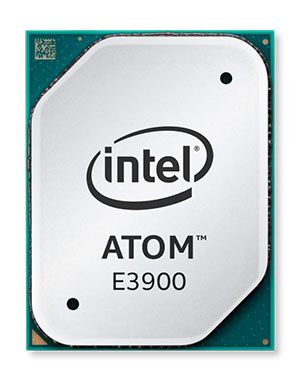Today, during IoT Solutions World Congress in Barcelona, Intel took the wraps off its new Intel Atom Processor E3900 Series processors, (codenamed “Apollo Lake”) for Internet of Things (IoT) applications. Three models make up the Atom E3900 lineup (x5-E3930, x5-E3940 and x7-E3950 processor). Joining them is the companion A3900 series for automotive applications, including software-defined cockpits and driver assistance technologies.
Atom E3900 processors run at speeds of up to 1.6 GHz (2 Ghz burst), as is the case with the quad-core x7-E3950 chip. They also feature Intel’s Time Coordinated Computing (TCC) Technology, available in the embedded Linux Yocto operating system. Able to synchronize device close across a network to within 1 microsecond, Intel TCC can help organizations better orchestrate their industrial IoT deployments and provide responsive, low-latency application services.

The chips are compact, energy-sipping powerhouses, according to Ken Caviasca, vice president of the Internet of Things Group and general manager of Platform Engineering and Development at Intel.
“With more than 1.7 times more computing power over the previous generation1, the E3900 Series is designed to enable faster memory speeds and memory bandwidth to provide the efficient processing capability needed for edge to cloud network computing,” explained Caviasca in an Oct. 25 blog post. “Built into a compact flip chip ball grid array (FCBGA) and featuring 14 nanometer silicon technology, the Intel Atom processor E3900 series is perfect for a wide range of IoT applications, where scalable performance, space and power are at a premium.”
In terms of visuals, the chips’ new graphics engine provides a 2.9x increase in 3D graphics performance, according to the company. Atom E3900 can decode up to 15 simultaneous high-definition video streams (1080p at 30 frames per second) and pump Ultra HD 4K at 60 Hz to three independent displays, according to the company.
All in all, the new chips pave the way for IoT devices that help lift some of the data processing burden from the cloud. “The Intel Atom processor E3900 series will make the edge and fog more intelligent – enabling many of the processing needs to take place at or near the data sensor and alleviating the need to push all processing to the data center,” said Caviasca.
Intel Atom A3900 series are currently available to select customers in sample quantities. Devices featuring the new chips should start showing up in the second quarter of 2017 after shipments begin in the first quarter.
Pedro Hernandez is a contributing editor at Datamation. Follow him on Twitter @ecoINSITE.
Huawei’s AI Update: Things Are Moving Faster Than We Think
FEATURE | By Rob Enderle,
December 04, 2020
Keeping Machine Learning Algorithms Honest in the ‘Ethics-First’ Era
ARTIFICIAL INTELLIGENCE | By Guest Author,
November 18, 2020
Key Trends in Chatbots and RPA
FEATURE | By Guest Author,
November 10, 2020
FEATURE | By Samuel Greengard,
November 05, 2020
ARTIFICIAL INTELLIGENCE | By Guest Author,
November 02, 2020
How Intel’s Work With Autonomous Cars Could Redefine General Purpose AI
ARTIFICIAL INTELLIGENCE | By Rob Enderle,
October 29, 2020
Dell Technologies World: Weaving Together Human And Machine Interaction For AI And Robotics
ARTIFICIAL INTELLIGENCE | By Rob Enderle,
October 23, 2020
The Super Moderator, or How IBM Project Debater Could Save Social Media
FEATURE | By Rob Enderle,
October 16, 2020
FEATURE | By Cynthia Harvey,
October 07, 2020
ARTIFICIAL INTELLIGENCE | By Guest Author,
October 05, 2020
CIOs Discuss the Promise of AI and Data Science
FEATURE | By Guest Author,
September 25, 2020
Microsoft Is Building An AI Product That Could Predict The Future
FEATURE | By Rob Enderle,
September 25, 2020
Top 10 Machine Learning Companies 2020
FEATURE | By Cynthia Harvey,
September 22, 2020
NVIDIA and ARM: Massively Changing The AI Landscape
ARTIFICIAL INTELLIGENCE | By Rob Enderle,
September 18, 2020
Continuous Intelligence: Expert Discussion [Video and Podcast]
ARTIFICIAL INTELLIGENCE | By James Maguire,
September 14, 2020
Artificial Intelligence: Governance and Ethics [Video]
ARTIFICIAL INTELLIGENCE | By James Maguire,
September 13, 2020
IBM Watson At The US Open: Showcasing The Power Of A Mature Enterprise-Class AI
FEATURE | By Rob Enderle,
September 11, 2020
Artificial Intelligence: Perception vs. Reality
FEATURE | By James Maguire,
September 09, 2020
Anticipating The Coming Wave Of AI Enhanced PCs
FEATURE | By Rob Enderle,
September 05, 2020
The Critical Nature Of IBM’s NLP (Natural Language Processing) Effort
ARTIFICIAL INTELLIGENCE | By Rob Enderle,
August 14, 2020

Datamation is the leading industry resource for B2B data professionals and technology buyers. Datamation's focus is on providing insight into the latest trends and innovation in AI, data security, big data, and more, along with in-depth product recommendations and comparisons. More than 1.7M users gain insight and guidance from Datamation every year.
Advertise with TechnologyAdvice on Datamation and our other data and technology-focused platforms.
Advertise with Us
Property of TechnologyAdvice.
© 2025 TechnologyAdvice. All Rights Reserved
Advertiser Disclosure: Some of the products that appear on this
site are from companies from which TechnologyAdvice receives
compensation. This compensation may impact how and where products
appear on this site including, for example, the order in which
they appear. TechnologyAdvice does not include all companies
or all types of products available in the marketplace.